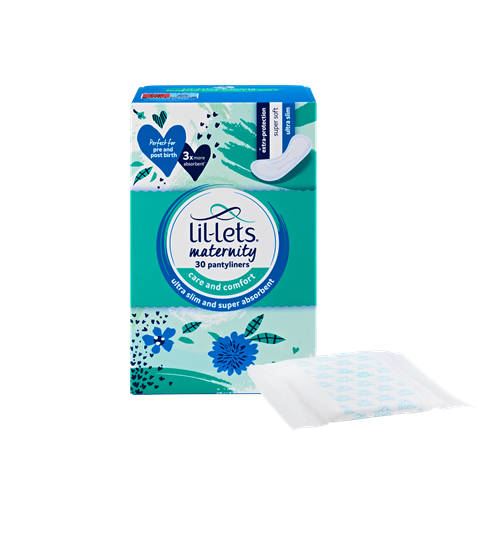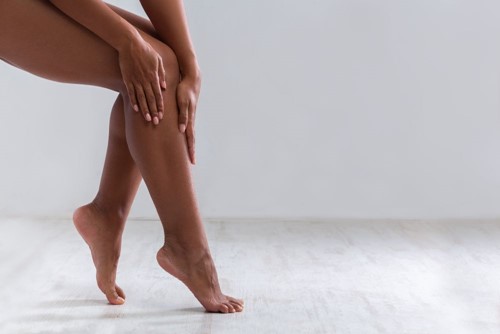Your growing baby bump and ever-increasing breast size are just some of the more obvious physical changes you’ll notice during pregnancy.
But there are other things that happen to your body during pregnancy that you might not be expecting!
Don’t worry! We’re here to give you the lowdown, so they don’t come as a complete surprise!
You’ll likely notice that your pregnancy hair becomes thicker and shinier during pregnancy. Yay! This is thanks to those lovely pregnancy hormones which keep your hair in its growing phase for longer.
However, don’t panic if once your baby has been born, or you finish breastfeeding some of it starts to fall out. This is perfectly normal and is due to a drop in oestrogen levels, and even though it may look like you're losing lots of hair every time you brush, don’t despair, it WILL start to grow back at around 6 months postpartum.
You’ve probably heard all about stretchmarks which can occur anywhere on the body during pregnancy, but you may not have heard about some of the other changes that can happen to your skin.
Increased blood flow is needed to support your growing baby and vital organs, and this is said to also impact the blood vessels of the face too, making you looked flushed and radiant, YIPEE!
Sadly, some of us may not be so lucky and pre-existing skin conditions such as acne, eczema and rosacea can flare up during pregnancy and may require you to rethink how these are treated. You may also notice dark patchy spots on the face, known as Chloasma or Melasma, these generally disappear once your baby is born.
And have you ever noticed how some women develop a dark line down the centre of their tummy! This is called “Linea Negra.” This hormone-induced streak can get darker by the time you reach your second trimester, but it’s completely harmless and is simply caused by an increase in skin pigmentation during this special time, and generally disappears a few months after delivery.
Isn’t it great that you don’t have periods whilst you’re pregnant? But hang on…. whilst they’ve disappeared for now, you might notice that you have more vaginal discharge than usual. This is totally fine and is called leucorrhoea.
This increase in vaginal discharge helps to prevent any nasty bacteria travelling from the vagina to the uterus, it’s often called the ‘mucus plug’.

It’s also true that the further into your pregnancy, the more discharge will be produced! This is an indication that the cervix is beginning to stretch and preparing your body for labour. It can leave you feeling damp and uncomfortable down there, so check out Lil-Lets maternity liners designed to keep you feeling fresh and dry throughout the day.
In the final week of pregnancy, you may notice a sticky, jelly-like pink mucus. This is called a "show” and happens when the mucus plug, (there’s that word again), that's been present in your cervix during pregnancy comes away and you’ll likely be meeting your baby very soon!
Whilst the amount of discharge you produce will increase during pregnancy, the colour will remain clear or milky white and should be fairly odour free. So, if you notice that your discharge is green or yellow, smells unpleasant, is itchy or sore around the entrance to the vagina, or you experience pain when you pee, have a chat to your Midwife or GP.
Lil-Lets Maternity Pantyliners Lil-Lets Maternity Intimate WipesDiastasis Recti, sometimes called divarication or abdominal separation, is when the two muscles that run down the middle of the stomach wall separate. This happens in around two-thirds of pregnant women and is due to the abdominal muscles stretching as your pregnancy progresses.
Although this may sound a little scary, it’s nothing to worry about. For some new mums the gap left will close on its own around 4 – 8 weeks after they give birth (though it may take longer depending on how large the gap is). For others, support from a physiotherapist or doctor may be needed. They can provide specific exercises to strengthen your abs and gradually close the gap. For a small minority of new mums, surgery may be required to stitch the abdominal wall muscles back into place.
Ok, so this probably sounds like a strange one, but we promise it’s true! The ligaments in your body stretch during pregnancy and this includes those in your feet. As a result, the arch of your foot may dip which can lead to an increase in shoe size.
You may also experience swelling of the feet, which can make you feel like your feet are much larger than before! Ensure you wear comfortable, well-fitting shoes that aren’t too tight (go for half a size or one size bigger than usual if needed.) Great news if you’re pregnant over the summer months as you can wear pretty sandals and comfy flip flops all day, every day!
Swelling of the hands, legs and feet in pregnancy is very normal to experience. It's often worse towards the end of the day and the further along you are in your pregnancy.
Ever wondered why this happens? Swelling is caused by the pressure of your growing womb and your body holding more water than usual when you're pregnant. This water tends to gather in the lowest parts of the body, especially when the weather is hot, or you have been standing a lot.
To help reduce swelling when pregnant; avoid standing for long periods of time where possible, try to rest with your feet up when you can, wear comfortable shoes that aren’t too tight, drink plenty of water throughout the day and try to take regular, light exercise such as walking.
If you notice any swelling that comes on suddenly, rather than gradually, don’t hesitate to call your Midwife or GP.

You may think haemorrhoids, (often called piles) and varicose veins are two completely different things, but they are actually quite similar and are fairly common for about a third of pregnant women, generally occurring during the third trimester when the weight of the baby and increased blood volume to this part of the body put pressure on veins causing them to enlarge and twist.
Whilst many will not even know they have them, haemorrhoids found just inside, or around the entrance to the rectum can bleed and cause pain or burning when releasing waste (poop).
They’re both generally short-term problems and improve once your baby is born, but you can do a few things to prevent, and even treat them if you are unlucky enough to suffer with either of them during pregnancy.
Try to avoid standing in one position for long periods of time, take regular exercise to improve circulation, and put your feet up when it’s convenient to do so, (this will help with swelling of the feet too!)
And if you suffer with constipation during your pregnancy, which can aggravate haemorrhoids, add extra fibre to your diet, such as wholemeal bread, fruit and vegetables.
Phew!! Who knew that so many things happened to your body whilst pregnant (as well as growing a baby?!) From your hair to your feet (and everything in-between) those pregnancy hormones have a lot to answer for!
Although these body changes are perfectly normal in pregnancy, if you’re ever concerned by any of them, contact your midwife or GP. For more information on changes to your body during pregnancy read Changes to your body in early pregnancy.
The last thing you want during your pregnancy and labour is to feel confused about what’s being said around you. To help, we’ve put together a simple guide to some of the most common pregnancy and birth terms, so you can feel more confident and prepared.
The A-Z of PregnancySo, you’ve recently found out you’re pregnant and I’m sure you’re experiencing a mix of emotions.
Changes To Your Body In Early PregnancyPregnancy has a huge impact on your body for a whole 9 months, and it's only natural during this time to feel the odd aches and pains. But how do you know what is normal pregnancy pain and what may be something more serious?
Pregnancy Pain And Discomfort
Increased hormones can make gums more sensitive and prone to swelling or bleeding.
Progesterone relaxes the muscles in the digestive tract, slowing down digestion which can for some cause constipation. Also, prenatal vitamins with iron can also contribute to constipation. Add more fruit, even in juice form to your diet along with lots of water to help ease the discomfort of constipation.
Both you and your baby need more oxygen when pregnant to keep up with all the changes your body is going through. In your 3rd Trimester the growing uterus can press against the diaphragm, making breathing more difficult.
The extra weight gained during pregnancy can naturally put strain on your back muscles. Your posture will change too as your centre of gravity changes, leading to back pain. And finally, the hormone 'Relaxin' which loosens ligaments and joints in preparation for childbirth, can leave you with lower back discomfort.